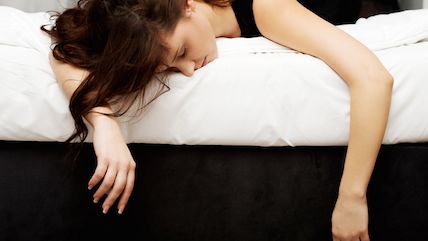Male Student Had Drunken Sex with Female Non-Student. Her Dad Called It Rape. Expulsion Imminent.
University of Texas-Austin requires accused student to prove his innocence at due-process-free hearing.


The University of Texas at Austin has recommended expulsion for a male student who was found responsible for sexual misconduct by the university's Title IX bureaucrats. But the woman he supposedly raped didn't formally accuse him—they remained friends and even flirted via text messages subsequent to the encounter.
In fact, it was the woman's father who initiated the Title IX proceedings against the male student, "John Doe," who is suing UT-Austin to prevent the university from expelling him.
The woman, "Jane Roe," is not a UT-Austin student, which raises an important question: Should a university really have a responsibility to meddle in students' private sex lives when parents of non-students file complaints?
The Title IX bureaucracy at UT-Austin evidently believes so.
The details of Doe's case are in many ways similar to dozens of other disputed rape cases, with one crucial difference: after some initial confusion, both parties eventually came to the conclusion that their sex was consensual, according to Doe's lawsuit.
The College Fix reported on the circumstances of the encounter. On March 6, 2015, Doe met Roe and her friend, "Jennifer Smith," at a party near campus. They headed back to Roe's apartment: Smith and Roe went to sleep in the bedroom, while Doe took the couch. Roe was reportedly very drunk. Soon after, Smith invited Doe into the bedroom, where they had sex while Roe was passed out.
Later, Roe woke up and initiated sexual contact with Doe. Smith noticed, and left the apartment to give them more privacy. They then engaged in sex. Both Smith and Doe believed Roe was fully conscious and capable of giving consent—she was awake, talking, and willing, according to the lawsuit. Doe left the apartment in the morning.
Afterward, Roe couldn't remember what had happened, and sent a text to Smith berating her for leaving Roe alone with Doe. Smith responded, "I'm sorry, I thought you wanted to have sex with him though."
Roe also contacted Doe, accusing him of taking advantage of her while she was unconscious. But Doe explained that she wasn't unconscious. Importantly, he explained that she had shared private information about herself—that she had appeared in pornographic films—during the encounter. This led Roe to concede that although she couldn't remember having sex with him, it "sounded passionate." She ceased accusing him, and even began exchanging flirtatious texts with him. On March 16 and 27, she even sent him sexy pictures of herself. They agreed to get together, though they never did.
But on April 8, Roe's father called UT's police department and told them Doe had sexually assaulted his daughter. His complaint was forwarded to UT's dean of students, who initiated a Title IX investigation, "despite the fact that Ms. Roe was not a UT student and despite her not personally making any claim that she had been sexually assaulted at that point," according to the lawsuit.
UT's Title IX investigators interviewed Doe, Roe, and Smith, and decided that Doe was guilty. On November 5, they recommended his expulsion.
Doe has the right to appeal that determination, and was granted a hearing with a panel of university employees. But this hearing lacks even a semblance of fairness. He is not afforded a lawyer—he must argue his case himself. Most notably, he has no power to compel witnesses to appear at the hearing: in other words, he can only cross-examine Smith and Roe if they choose to attend. In fact, UT's rules bar him from questioning the "complainant" even if she does show up (it's not precisely clear to me who the complainant even is, since Roe's father initiated the proceedings).
In summary: Doe has already been found guilty by a team of Title IX investigators. The responsibility now rests with him to prove he is innocent of sexually assaulting a non-student who never formally accused him of wrongdoing until her father initiated the complaint. Doe is equipped with no tools to achieve this task, since none of the relevant parties are members of campus—nor would they have any obligation to participate, even if they were.
I've read the text messages and other documents relating to the case. They paint a clear portrait of a messy, drunken hookup that led to hurt feelings between Smith and Roe, and Roe and Doe. But drunken sex is not illegal, and hurting someone's feelings should not be grounds for expulsion.
Doe's lawsuit alleges gender discrimination and abridgement of due process. I'll be watching this one closely. [Related: Students Had BDSM Sex. Male Says He Obeyed Safe Word. GMU Agreed, Expelled Him Anyway.]


Show Comments (142)